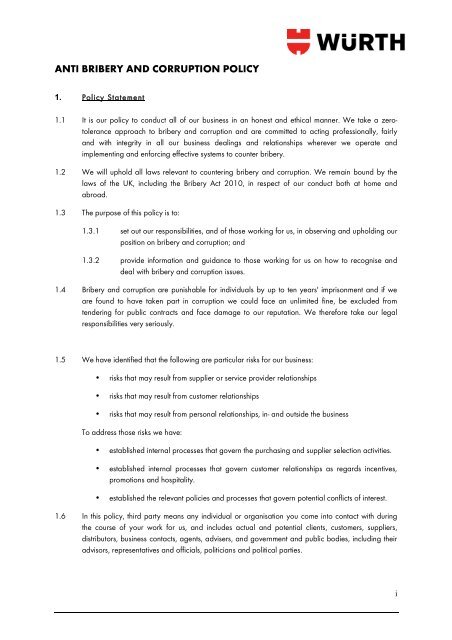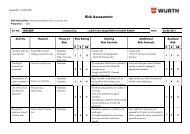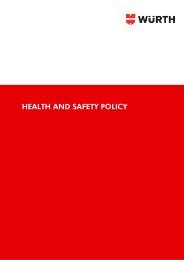ANTI BRIBERY AND CORRUPTION POLICY - Wurth
ANTI BRIBERY AND CORRUPTION POLICY - Wurth
ANTI BRIBERY AND CORRUPTION POLICY - Wurth
Create successful ePaper yourself
Turn your PDF publications into a flip-book with our unique Google optimized e-Paper software.
<strong>ANTI</strong> <strong>BRIBERY</strong> <strong>AND</strong> <strong>CORRUPTION</strong> <strong>POLICY</strong><br />
1. Policy Statement<br />
1.1 It is our policy to conduct all of our business in an honest and ethical manner. We take a zerotolerance<br />
approach to bribery and corruption and are committed to acting professionally, fairly<br />
and with integrity in all our business dealings and relationships wherever we operate and<br />
implementing and enforcing effective systems to counter bribery.<br />
1.2 We will uphold all laws relevant to countering bribery and corruption. We remain bound by the<br />
laws of the UK, including the Bribery Act 2010, in respect of our conduct both at home and<br />
abroad.<br />
1.3 The purpose of this policy is to:<br />
1.3.1 set out our responsibilities, and of those working for us, in observing and upholding our<br />
position on bribery and corruption; and<br />
1.3.2 provide information and guidance to those working for us on how to recognise and<br />
deal with bribery and corruption issues.<br />
1.4 Bribery and corruption are punishable for individuals by up to ten years' imprisonment and if we<br />
are found to have taken part in corruption we could face an unlimited fine, be excluded from<br />
tendering for public contracts and face damage to our reputation. We therefore take our legal<br />
responsibilities very seriously.<br />
1.5 We have identified that the following are particular risks for our business:<br />
• risks that may result from supplier or service provider relationships<br />
• risks that may result from customer relationships<br />
• risks that may result from personal relationships, in- and outside the business<br />
To address those risks we have:<br />
• established internal processes that govern the purchasing and supplier selection activities.<br />
• established internal processes that govern customer relationships as regards incentives,<br />
promotions and hospitality.<br />
• established the relevant policies and processes that govern potential conflicts of interest.<br />
1.6 In this policy, third party means any individual or organisation you come into contact with during<br />
the course of your work for us, and includes actual and potential clients, customers, suppliers,<br />
distributors, business contacts, agents, advisers, and government and public bodies, including their<br />
advisors, representatives and officials, politicians and political parties.<br />
i
2. Who Is Covered By The Policy?<br />
This policy applies to all individuals working at all levels and grades, including senior managers,<br />
officers, directors, employees (whether permanent, fixed-term or temporary), consultants,<br />
contractors, trainees, seconded staff, home workers, casual workers and agency staff, volunteers,<br />
interns, agents, sponsors, or any other person associated with us, or any of our subsidiaries or their<br />
employees, wherever located (collectively referred to as workers in this policy).<br />
3. What Is Bribery?<br />
A bribe is an inducement or reward offered, promised or provided in order to gain any<br />
commercial, contractual, regulatory or personal advantage.<br />
Examples:<br />
Offering a bribe<br />
You offer a potential client tickets to a major sporting event, but only if they agree to do business<br />
with us.<br />
This would be an offence as you are making the offer to gain a commercial and contractual<br />
advantage. We may also be found to have committed an offence because the offer has been<br />
made to obtain business for us. It may also be an offence for the potential client to accept your<br />
offer.<br />
Receiving a bribe<br />
A supplier gives your nephew a job, but makes it clear that in return they expect you to use your<br />
influence in our organisation to ensure we continue to do business with them.<br />
It is an offence for a supplier to make such an offer. It would be an offence for you to accept the<br />
offer as you would be doing so to gain a personal advantage.<br />
Bribing a foreign official<br />
You arrange for the business to pay an additional payment to a foreign official to speed up an<br />
administrative process, such as clearing our goods through customs.<br />
The offence of bribing a foreign public official has been committed as soon as the offer is made.<br />
This is because it is made to gain a business advantage for us. We may also be found to have<br />
committed an offence.<br />
4. Gifts And Hospitality<br />
4.1 This policy does not prohibit normal and appropriate hospitality (given and received) to or from<br />
third parties. Please obtain the approval of your line manager before incurring any expenditure for<br />
hospitality.<br />
4.2 The giving or receipt of gifts is prohibited, unless the following requirements are met:<br />
ii
4.2.1 it is not made with the intention of influencing a third party to obtain or retain business<br />
or a business advantage, or to reward the provision or retention of business or a<br />
business advantage, or in explicit or implicit exchange for favours or benefits;<br />
4.2.2 it complies with local law;<br />
4.2.3 it is given in our name, not in your name;<br />
4.2.4 it does not include cash or a cash equivalent (such as gift certificates or vouchers),<br />
unless this forms part of an authorised and approved incentive scheme, records of<br />
which are maintained and kept by the Company;<br />
4.2.5 it is appropriate in the circumstances. For example, a small gift to be given at Christmas<br />
time;<br />
4.2.6 taking into account the reason for the gift, it is of an appropriate type and value and<br />
given at an appropriate time;<br />
4.2.7 it is given openly, not secretly; and<br />
4.2.8 gifts should not be offered to, or accepted from, government officials or representatives,<br />
or politicians or political parties.<br />
4.2.9 Its value of £40 or less.<br />
4.3 We appreciate that the practice of giving business gifts varies between countries and regions and<br />
what may be normal and acceptable in one region may not be in another. The test to be applied is<br />
whether in all the circumstances the gift or hospitality is reasonable and justifiable. The intention<br />
behind the gift should always be considered. If you wish to receive or give a gift outside the above<br />
rules, you must obtain the approval of your line manager before doing so<br />
5. What Is Not Acceptable?<br />
5.1 It is not acceptable for you (or someone on your behalf) to:<br />
5.1.1 give, promise to give, or offer, a payment, gift or hospitality with the expectation or<br />
hope that a business advantage will be received, or to reward a business advantage<br />
already given;<br />
5.1.2 give, promise to give, or offer, a payment, gift or hospitality to a government official,<br />
agent or representative to "facilitate" or expedite a routine procedure;<br />
5.1.3 accept payment from a third party that you know or suspect is offered with the<br />
expectation that it will obtain a business advantage for them;<br />
5.1.4 accept a gift or hospitality from a third party if you know or suspect that it is offered or<br />
provided with an expectation that a business advantage will be provided by us in<br />
return;<br />
5.1.5 threaten or retaliate against another worker who has refused to commit a bribery<br />
offence or who has raised concerns under this policy; or<br />
iii
5.1.6 engage in any activity that might lead to a breach of this policy.<br />
6. Facilitation Payments And Kickbacks<br />
6.1 We do not make, and will not accept, facilitation payments or "kickbacks" of any kind. Facilitation<br />
payments are typically small, unofficial payments made to secure or expedite a routine government<br />
action by a government official. They are not commonly paid in the UK, but are common in some<br />
other jurisdictions.<br />
6.2 If you are asked to make a payment on our behalf, you should always be mindful of what the<br />
payment is for and whether the amount requested is proportionate to the goods or services<br />
provided. You should always ask for a receipt which details the reason for the payment. If you<br />
have any suspicions, concerns or queries regarding a payment, you should raise these with your<br />
line manager.<br />
6.3 Kickbacks are typically payments made in return for a business favour or advantage. All workers<br />
must avoid any activity that might lead to, or suggest, that a facilitation payment or kickback will be<br />
made or accepted by us.<br />
7. Your Responsibilities<br />
7.1 You must ensure that you read, understand and comply with this policy.<br />
7.2 The prevention, detection and reporting of bribery and other forms of corruption are the<br />
responsibility of all those working for us or under our control. All workers are required to avoid any<br />
activity that might lead to, or suggest, a breach of this policy.<br />
7.3 You must notify your manager or the PIV management board as soon as possible if you believe or<br />
suspect that a conflict with this policy has occurred, or may occur in the future. For example, if a<br />
client or potential client offers you something to gain a business advantage with us, or indicates to<br />
you that a gift or payment is required to secure their business. Further "red flags" that may indicate<br />
bribery or corruption are set out in the The Schedule.<br />
7.4 Any employee who breaches this policy will face disciplinary action, which could result in dismissal<br />
for gross misconduct.<br />
8. Record-keeping<br />
8.1 We must keep financial records and have appropriate internal controls in place which will<br />
evidence the business reason for making payments to third parties.<br />
8.2 You must declare and keep a written record of all hospitality or gifts accepted or offered, which will<br />
be subject to managerial review.<br />
iv
8.3 You must ensure all expenses claims relating to hospitality, gifts or expenses incurred to third parties<br />
are submitted in accordance with our expenses policy and specifically record the reason for the<br />
expenditure.<br />
8.4 All accounts, invoices, memoranda and other documents and records relating to dealings with third<br />
parties, such as clients, suppliers and business contacts, should be prepared and maintained with<br />
strict accuracy and completeness. No accounts must be kept "off-book" to facilitate or conceal<br />
improper payments.<br />
9. How To Raise A Concern<br />
You are encouraged to raise concerns about any issue or suspicion of malpractice at the earliest<br />
possible stage. If you are unsure whether a particular act constitutes bribery or corruption, or if you<br />
have any other queries, these should be raised with your line manager or the compliance manager.<br />
Concerns should be reported by following the procedure set out in our Whistleblowing Policy. A<br />
copy of our Whistleblowing Policy can be obtained upon request or may be found in the Employee<br />
Handbook or the Company’s Intranet.<br />
10. What To Do If You Are A Victim Of Bribery Or Corruption<br />
It is important that you tell your line manager or the PIV management board as soon as possible if<br />
you are offered a bribe by a third party, are asked to make one, suspect that this may happen in<br />
the future, or believe that you are a victim of another form of unlawful activity.<br />
11. Protection<br />
11.1 Workers who refuse to accept or offer a bribe, or those who raise concerns or report another's<br />
wrongdoing, are sometimes worried about possible repercussions. We aim to encourage openness<br />
and will support anyone who raises genuine concerns in good faith under this policy, even if they<br />
turn out to be mistaken.<br />
11.2 We are committed to ensuring no one suffers any detrimental treatment as a result of refusing to<br />
take part in bribery or corruption, or because of reporting in good faith their suspicion that an<br />
actual or potential bribery or other corruption offence has taken place, or may take place in the<br />
future. Detrimental treatment includes dismissal, disciplinary action, threats or other unfavourable<br />
treatment connected with raising a concern. If you believe that you have suffered any such<br />
treatment, you should inform the compliance manager immediately. If the matter is not remedied,<br />
and you are an employee, you should raise it formally using our Grievance Procedure.<br />
v
12. Training and Communication<br />
12.1 Training on this policy forms part of the induction process for all new workers. Where appropriate<br />
all existing workers will receive regular, relevant training on how to implement and adhere to this<br />
policy.<br />
12.2 Our zero-tolerance approach to bribery and corruption must be communicated to all suppliers,<br />
contractors and business partners at the outset of our business relationship with them and as<br />
appropriate thereafter.<br />
13. Who Is Responsible For The Policy?<br />
13.1 The board of directors has overall responsibility for ensuring this policy complies with our legal and<br />
ethical obligations, and that all those under our control comply with it.<br />
13.2 The PIV management board has primary and day-to-day responsibility for implementing this policy<br />
and for monitoring its use and effectiveness. Management at all levels are responsible for ensuring<br />
those reporting to them are made aware of and understand this policy and are given adequate<br />
and regular training on it.<br />
14. Monitoring And Review<br />
14.1 The PIV management board will monitor the effectiveness and review the implementation of this<br />
policy, regularly considering its suitability, adequacy and effectiveness. Any improvements<br />
identified will be made as soon as possible. Internal control systems and procedures will be subject<br />
to regular audits to provide assurance that they are effective in countering bribery and corruption.<br />
14.2 All employees are responsible for the success of this policy and should ensure they use it to disclose<br />
any suspected danger or wrongdoing.<br />
14.3 Employees are invited to comment on this policy and suggest ways in which it might be improved.<br />
Comments, suggestions and queries should be addressed to the compliance manager.<br />
14.4 This policy does not form part of any employee's contract of employment and it may be amended<br />
at any time.<br />
vi
The Schedule<br />
Potential Risk Scenarios: "red Flags"<br />
1.1 The following is a list of possible red flags that may arise during the course of you working for us<br />
and which may raise concerns under various anti-bribery and anti-corruption laws. The list is not<br />
intended to be exhaustive and is for illustrative purposes only.<br />
If you encounter any of these red flags while working for us, you must report them promptly to your<br />
manager or the PIV management board or using the procedure set out in the whistleblowing policy:<br />
1.2 you become aware that a third party engages in, or has been accused of engaging in, improper<br />
business practices;<br />
1.3 you learn that a third party has a reputation for paying bribes, or requiring that bribes are paid to<br />
them, or has a reputation for having a "special relationship" with foreign government officials;<br />
1.4 a third party insists on receiving a commission or fee payment before committing to sign up to a<br />
contract with us, or carrying out a process for us;<br />
1.5 a third party requests payment in cash and/or refuses to provide an invoice or receipt for a<br />
payment made;<br />
1.6 a third party requests that payment is made to a country or geographic location different from<br />
where the third party resides or conducts business;<br />
1.7 a third party requests an unexpected additional fee or commission to "facilitate" a service;<br />
1.8 a third party demands<br />
1.9 entertainment or gifts before commencing or continuing contractual negotiations or provision of<br />
services;<br />
1.10 a third party requests that a payment is made to "overlook" potential legal violations;<br />
1.11 a third party requests that you provide employment or some other advantage to a friend or relative;<br />
1.12 you receive an invoice from a third party that appears to be non-standard or customised;<br />
1.13 you notice that goods are repeatedly returned from third parties who claim not to have ordered<br />
them;<br />
1.14 a third party refuses to put terms agreed in writing;<br />
1.15 you notice that we have been invoiced goods or services that appears large given the goods or<br />
services stated to have been provided;<br />
1.16 a third party requests or requires the use of an agent, intermediary, consultant, distributor or<br />
supplier that is not typically used by or known to us;<br />
vii
1.17 you are offered an unusually generous gift or offered lavish hospitality by a third party;<br />
Wayne Moss<br />
Managing Director, Würth UK Ltd<br />
viii

















